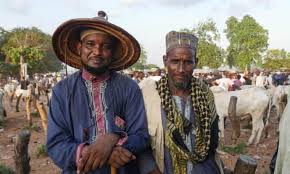Land, the greatest human asset for generational wealth: Emerging Threats to Yoruba People
Land, the greatest human asset for generational wealth: Emerging Threats to Yoruba People
By Bamidele Ola
Most wars, whether World Wars, between Nations, Countries, tribes and peoples, have always been about conquest of territories, be it land, sea or air space and all resources that are contained in them. Land and Sea contains most importantly, resources be it liquid and solid minerals that is known to man. Job 28: 1 – 25, Deuteronomy 8: talks of mineral wealth domiciled in lands and waters, around which revolve conflict and wars.
- Recognizing these facts, powerful nations have developed national militaries capable of protecting their territorial borders on three fronts of battle, on land (army), air (Air Force), and the territorial waters (Navy).
- The unending wars between Israel and Palestinian forces in Gaza and West Bank, dating back to the Biblical days of Abraham, Isaac and Jacob, are about the control of land and sea. The war between Russia and Ukraine is all about land and resources. The war between Sudan and South is about oil. The destruction of Iraq and Libya by the West is all about their immense oil reserves. Colonialism was all about conquering lands and resources for the colonial powers.
THE IMPORTANCE OF LAND AS AN INCUBATOR OF GENERATIONAL WEALTH
It must be emphasized that land is the greatest incubator of wealth in any society. Families transfer lands and properties from one generation to another to preserve generational wealth. - Nations and States enact laws to prevent the abuse of the purchase of lands and properties by wealthy individuals who are not indigenous to those nation. Such laws are to protect indigenous lands from individuals with unexplained sources of wealth who however possess an unfair cash advantage over locals. For example, the state of Florida in the USA, in 2022, enacted a law approved by the State legislature, preventing the sale of lands and properties to Chinese Nationals, who are suspected to have been financially empowered by the Chinese government to buy lands and properties all over the world as a state policy. In the same 2022, Canada, facing a housing crisis, emended mortgage laws and barred foreigners from buying properties because their speculative activities in the property market drove up housing prices in the provinces (States) of Ontario and British Colombia.
- Securing land rights for indigenous populations by legislation is key to future Agricultural production to match growing population and consumption, and the increased demand for food.
- Securing land rights is key to urban development as rural urban migration continues to increase. Absence of land right and inarticulate land policies allows speculators to inflate land and property prices. Some speculators, in their drive for appreciation of property values, covert residential properties into commercial purposes, driving up prices of real estate.
- Securing land rights is key to proper environmental management. Those who have turned residential properties into commercial buildings do so with utter disregard for the environment, putting a severe strain on government utilities provision and waste management. Urban cleanliness, forests resources management and protection of forests for future generations, are key in securing land rights for indigenous peoples.
- Securing land rights is key to avoiding conflict driven by territorial conquests. As earlier stated, most conflicts in the world are drivers by the desire of nations and people to acquire more territories and expand their geopolitical influence and advance their economic well-being.
THE LOOMING CRISIS OF WHOLESALE LAND AND PROPERTY ACQUISITION BY NON INDIGENOUS POPULATION IN THE SOUTHWEST, INCLUDING EKITI STATE
In recent times, the Southwest part of Nigeria including Ekiti State, had and still continues to witness an unprecedented influx of non indigenous peoples from other parts of Nigeria, most especially from the South East.
- Having subjected their Southeast Region into instability and chaos, they migrate in massive numbers into the Southwest, with an unstated agenda of economic insurgency and ultimately political power, by altering the demographic structure of many southwest states with huge numbers and with ability to influence political outcomes. They deploy resources from questionable sources into massive property and land acquisition, gaining critical footholds to determine the direction of politics in the SW region in the future, if left unchecked.
- There have been proven and unproven allegations that some of the monies deployed to purchasing properties and land all over the SW by these individuals are proceeds of narcotics trafficking. These illicitly obtained resources have also been deployed to importing car spare parts and fake drugs. In Lagos for example, a lot of unexplained wealth have been deployed to developing or purchasing properties in Lekki – Ajah axis while some residential houses were converted to warehousing hard drugs and narcotics that are destroying the lives of young people in the southwest.
- It must be stated clearly that there is no barrier to individuals of Nigerian origin to purchasing lands and properties all over Nigeria. However, when individuals of a certain geographical zone, who have declared their lands inaccessible to foreigners, aggressively seek spaces elsewhere, quoting one Nigeria with a sleight of hand, it behoves on other regional and state governments to apply the principle of reciprocity, in the overall interests of local and indigenous peoples, to be protected from such economic insurgents, even when the indigenes do not know better.
When those individuals deploy proceeds of illicit drug trafficking and sharp practices, which tend to yield instant gratifications and profits at the expense of poor ordinary hardworking citizens, for the purchase of lands and properties in other geopolitical zones, it is the responsibility of leadership elite of those zones, be it traditional, political, religious, public service and cultural, to protect their people against economic insurgents, seeking undue advantage to take over lands and properties with illicitly acquired financial resources, against which local people cannot compete. - A foreigner cannot buy land in China for example. Why should our irrational liberalism in the Southwest allow us cede our land to economic insurgents who seek our domination and downfall? Why should we in the SW? Their ultimate and unstated agenda is economic conquest followed by political domination. This they achieve by their so-called apprenticeship system, wherein a “business owner” brings 7 or more individuals from his village to be “mentored and trained” under him. Those 7 apprentices would each be established and encouraged to bring 7 other apprentices, making 49 in a cycle of apprenticeship training. Some of them would come with their relatives into the apprenticeship system because that is their way.
In a very short span of time, the demographic structure of a state or region is completely altered and diluted to reflect a majority of non indigenous people who are eligible for property acquisition and to vote. - I call then economic and political insurgents for the purpose of this write up, against which the leaderships of the Southwest and indeed, Ekiti State Government, MUST as a matter of urgency, take some measure or enact legislation that will protect Ekiti people and indeed, core Yoruba people, from this nefarious but unstated and instinctive agenda.
WHAT EKITI STATE COULD DO TO STEM THIS TIDE AND PUT A GRADUAL AND SUBTLE STOP TO THE ACTIVITIES OF THESE ECONOMIC INSURGENTS:
- The traditional institutions should, with immediate effect, dismantle the idea of “Eze Indigbo” or King of the Igbos in our domain. There can never be two kings in the Palace. There can only be multiple of Chiefs. If the Eze Ndigbo is allowed, it should be a figurehead for dealing with issues affecting their people, not to wear a crown or command any authority in Yoruba land. All traditional authorities resides with the King. The Ewi can never be equalled to a “so called” Eze Ndigbo. Dichotomy must be banned forthwith. At best, a non titular head who liaises with the palace on behalf issues of their welfare could be permitted.
- No sale of ancestral land or properties to non indigenes should be permitted forthwith except with the approval of the Traditional Ruler, the Ewi in the case of Ado Ekiti. Where such sales are conducted without the knowledge of the traditional and state authorities, it should be deemed illegal.
- A non indigenous person who purchased land or property and obtains the Certificate of Occupancy but doesn’t develop the land within a time frame, like two to three years, shall forfeit the land back to the State Government.
- The leasehold stated on a Certificate of Occupancy for a non indigene can be reduced retroactivity from the usual 99 years to 20 – 25 years and can be renewed only at the pleasure of the serving Governor. Toward this, the state House of Assembly could be lobbied to pass such a legislation retroactively in the interest of the State, irrespective of the fact that some non indigenes have C of O with 99 years lease hold. The then Governor Wike of Rovers State reduced the period of which a Certificate of Occupancy is tenable from 99 years to 35 years, where he saw that strangers from elsewhere were now claiming Rivers State as part of their Republic. Not only that, he prescribed the celebration of cultural days that tend to elevate certain ethnic groups as superior to the ethics groups indigent to Rivers State.
- Strict inheritance laws and taxes that makes the transfer of properties and lands to children for non indigenes difficult or expensive should be enacted. By so doing, we stop economic and political insurgents from transferring their agenda to their offspring when they pass on. The Zikist agenda had never died in the SW despite that Zik has been dead for decades.
- The conversion of residential houses to commercial uses should be halted forthwith. Such conversion put a lot of pressure on environmental concerns and take little cognizance of the pressure brought on the provision of additional electricity, waste disposal, water, security etc. Residential areas are not for commercial purposes. That is the best practices globally.
- Certain forest areas or large expanse of land should be reserved under State Government Protection and must not be sold. If it is to be sold, it must be to indigenous buyers for industrial or commercial purposes only.
- Where a non indigent is buying land in Ekiti State, he must be able to present tax clearance certificates, evidence of the purpose of buying the land etc, traceable and verifiable evidence of past business activities. This is to prevent our lands being sold to economic insurgents with illicitly acquired wealth to buy lands as they please.
- The sale of ancestral land and properties by indigenes to non indigenes without recourse to the Palace for historical perspectives must be stopped forthwith. If our people are ignorant about the value of land in incubating generational wealth, the leadership cannot claim ignorance. We must protect our people in their ignorance and preserve our heritage for future generations.
- Industrial and commercial zones should be properly designated as such for entrepreneurs seeking to build industries or potential investors. The idea that an outsider could come, buy a piece of land and property meant for residential purposes, convert it to commercial use and unregulated retail trade activities, should be be banned in Ekiti State.
- Educating and sensitizing South West youths on the importance of land in holding generational wealth is key to the success of all the measure above. In addition, equipping them with skills and development of talents for life survival such that they would not be o impoverished to sell their inheritances and ancestral lands to economic predators with questionable sources of wealth, is key.”
.



